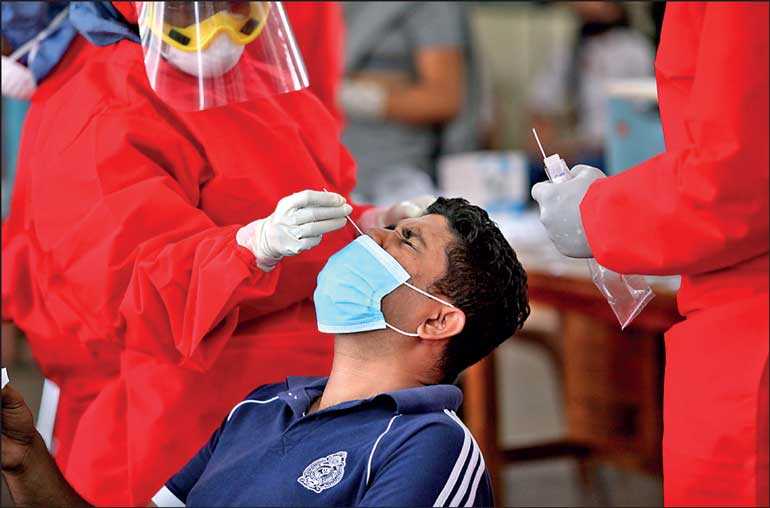Sunday Apr 20, 2025
Sunday Apr 20, 2025
Friday, 6 November 2020 00:30 - - {{hitsCtrl.values.hits}}

Given the enlarging COVID-19 clusters Sri Lanka is currently experiencing, it is critical that the country’s testing capacity is ramped up, along with its treatment capacity.
Sri Lanka has to date employed only Polymerase Chain Reaction (PCR) testing, which is a highly sensitive molecular test that typically delivers an accurate result with no need for repetition. PCR Testing requires complex machinery in a laboratory setting to obtain accurate results, a process which takes a minimum of six hours. Sri Lanka’s full PCR Testing capacity currently lies between 9000-10,000 tests per day.
While PCR remains the gold standard, the rapid rise of infections globally has also necessitated the augmentation of PCR tests with other methods, such as rapid diagnostic tests to scale up testing capacity. WHO Director General Dr. Tedros Adhanom explains, “High-quality rapid tests show us where the virus is hiding, which is key to quickly tracing and isolating contacts and breaking the chains of transmission. The tests are a critical tool for governments as they look to reopen economies and ultimately save both lives and livelihoods.”
The World Health Organisation, evaluated several rapid, point of care antigen tests and in September, granted Emergency Use Listing (EUL) to two such rapid tests developed by Abbott Diagnostics and SD Biosensor. The WHO has noted these two tests are ‘highly portable, reliable, and easy to administer … faster and cheaper than laboratory-based tests, enabling countries to increase the pace of testing, tracing and treating people for COVID-19 at the point of care’.
Rapid Tests enable countries to substantially increase testing without heavy investments in expanding laboratories and technical capacity. The Rapid Diagnostic Test (RDT) works by detecting the presence of virus proteins on samples are obtained through a nasal or throat swab. These rapid tests produce results within 15 to 20 minutes. Importantly however, these tests are best used for screening purposes within seven days of infection; PCR testing will still be required for confirmation. Where accuracy is concerned, the tests from Abbott Diagnostic for example is reported to have a sensitivity of 91.4% and specificity of 99.8% during clinical evaluation.
In addition to WHO approval, the Rapid Tests manufactured by Abbott Diagnostics and SD Biosensor have received approval for use from the TGA Australia, Health Canada, Health Sciences Authority – Singapore and other regulated markets in Europe, including France, Germany and the UK. The tests are now in use and freely available in over 100 countries worldwide.
The registration process of these products in Sri Lanka commenced in March-April 2020 and was re-activated following the grant of the Emergency Use Listing by WHO, with the local agents requesting the National Medicines Regulatory Authority (NMRA) to consider approval since the WHO evaluation was now in place.
The NMRA has granted approval for these rapid tests under the conditions that the test is only made available to healthcare institutions at a price pre-approved by the NMRA, and used under the guidelines issued by the Ministry of Health.
National Medicines Regulatory Authority Chairman Prof. Asita De Silva stated, “RT-PCR testing is the gold standard for identifying current COVID-19 infection in an individual. But PCR testing involves collecting samples, transporting in an appropriate medium to a laboratory for analysis, takes at least a few hours to return results and is expensive. Therefore, PCR is not considered an efficient tool for screening for COVID-19, especially in large segments of the population.
“Screening testing is performed to identify persons who may be contagious so that measures can be taken to prevent further transmission. This is where Antigen Rapid Diagnostic Tests intended to identify infected persons who are asymptomatic and without known or suspected exposure to COVID-19 are useful. They are relatively inexpensive and can be used at the point-of-care.
“The WHO has evaluated and listed two such antigen rapid test kits. The National Medicines Regulatory Authority (NMRA), has granted market authorisation to the two rapid antigen tests recommended by the WHO after mandatory review and expert consultation. We have made it very clear these tests should be used under expert supervision and should not be made available for personal use to the general public.”
Abbott Diagnostics is represented in Sri Lanka by George Steuart Health, one of the most respected and trusted pharmaceutical companies in Sri Lanka and a leader in several pharma categories including oncology, cardiology, rheumatology, endocrinology, diagnostics and gastroenterology.